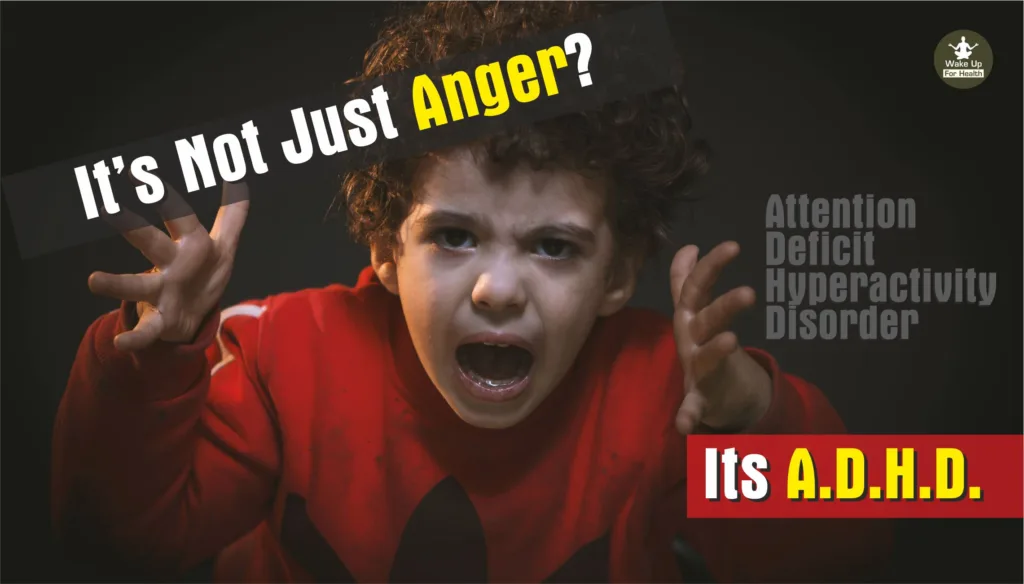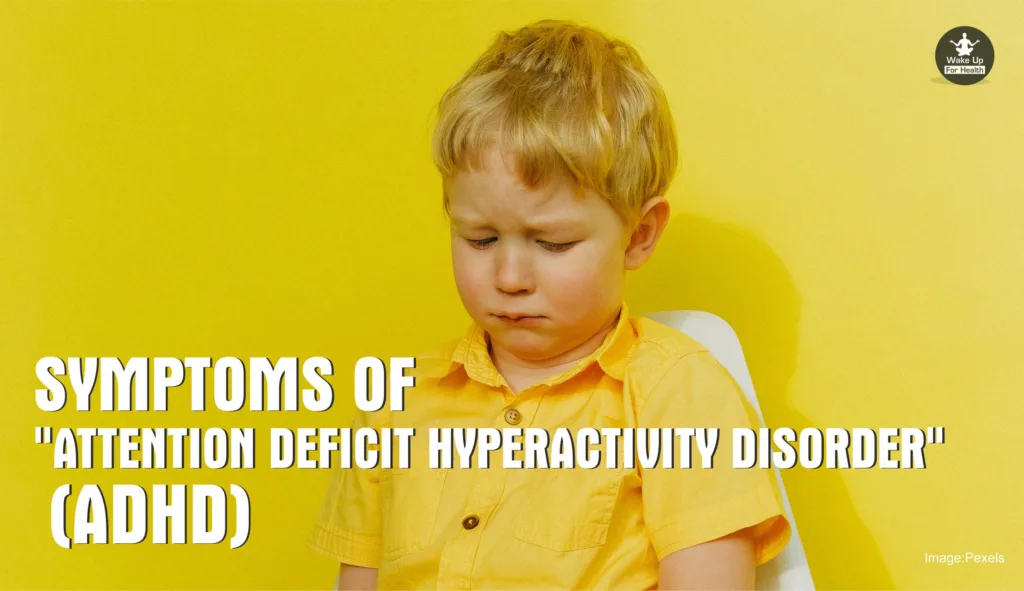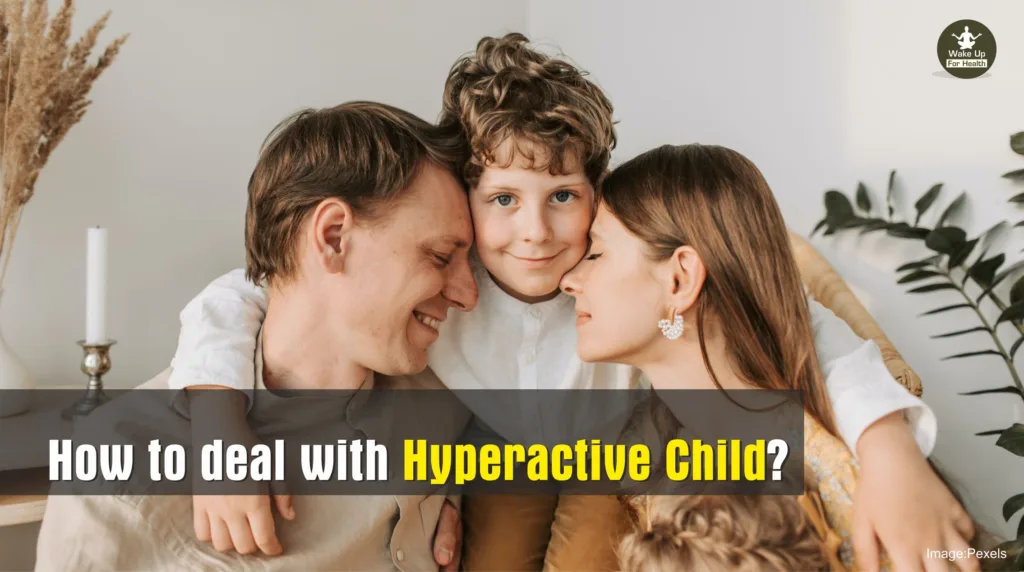Does your child find it difficult to concentrate on a task? Does he have trouble staying in one place? Does his behavior include inattention, hyperactivity, and impulsivity. If he has these problems and you feel they are negatively affecting his daily life, it could be a sign of attention deficit hyperactivity disorder (ADHD). Yes, it is a psychological problem which is generally seen in children, but due to lack of timely treatment, it can also be seen in adolescents and adults. So, we will know below in brief about Attention Deficit Hyperactivity Disorder (ADHD) and Symptoms, Causes, Treatment for ADHD.

What is Hyperactivity Disorder (ADHD)?, Managing ADHD in Children
Attention Deficit Hyperactivity Disorder or ADHD is a condition that greatly hinders the normal personality development of a child. This problem persists throughout the life of the sufferers, but still, it can be controlled and kept at bay. ADHD can be treated in two different ways, although the best results are often found when the two are combined.
Attention deficit hyperactivity disorder (ADHD) is a condition in which a person has trouble concentrating on tasks. In this disorder, the person feels difficulty in paying attention and controlling their impulsive behaviour. He either becomes restless or can be active almost continuously. Usually this problem starts in childhood and continues even in the teenage years.
Teenage Stress Also effecting our Generation. MUST KNOW.
How Know Your Child is Hyperactive?, Recognizing Symptoms”, Treatment Approaches
Some of the symptoms or signs that are clearly visible in a child suffering from ADHD include the following:
• • The child’s behavior is very aggressive during situations like play.
• • Behavior that is unusually bold.
• • Unusual or unconscious behavior of the child.
• • Feeling of fearlessness in the child may put the child or others in danger.
• • Inability of the affected child to jump on one leg.
• • Lack of attention and unable to concentrate.
• • The nature of being impulsive dominates the ADHD child.
Does Hyperactivity Mean ADHD?
ADHD or Attention-Deficit/Hyperactivity Disorder is an abnormality characterized by lack of orientation as well as focus and exhibits features that disturb the normal process of functioning and development. Hyperactivity is a characteristic of ADHD.
Attention deficit hyperactivity disorder exhibits the following characteristics or symptoms:
1). Inattention: It refers to the disorientation of the affected person, which lacks proper attention and concentration. He loses his persistence in any work and is always disorganized.
2). Hyperactivity: This refers to abnormal activity of the affected person. The person continues to move in an inappropriate manner without the need or condition that involves the movement. It is accompanied by restlessness or slurred speech.
3). Impulsivity: This condition refers to the loss of ability to think before making any important decision about anything. Taking quick decisions without proper thinking about the consequences involved proves to be harmful in many situations.
Ways to Relieve Psychological Stress?
SYMPTOMS OF “ATTENTION DEFICIT HYPERACTIVITY DISORDER” (ADHD)

• Getting distracted easily, forgetting things, and often moving from one task to another without completing it.
• Difficulty maintaining focus on a task.
• Difficulty in organizing, completing a task, or learning something new.
• Don’t sit at one place.
• Talking excessively or doing or saying anything without thinking.
• Keep on doing wrong things even after refusing.
• Answering before the question is completed or constantly interrupting.
• Get confused easily.
Difficulty processing information quickly and accurately compared to others.
• Getting lost in imagination, dreams and thoughts
• Forgetting things quite often
• Excessive whining and extravagance
• Talking too much or not talking at all
• Make careless mistakes or take unnecessary risks
• Having difficulty resisting temptation
• Has trouble turning
• Has difficulty getting along with others
Attention Deficit Hyperactivity Disorder Inattentive Type
Inattentiveness can often be felt due to ADHD, in which the following symptoms may appear :
• • Having a short attention span and being easily distracted.
• • Appearing forgetful or losing things.
• • Constantly changing activity or task.
• • Being unable to stick with tedious or time-consuming tasks.
• • Seeming unable to listen or follow instructions.
• • Difficulty organizing tasks.
• • Making careless mistakes – for example, in schoolwork
8 Easy Ways to Calm Your Mind.
What is Hyperactivity and Impulsivity or Impulsiveness?
Having ADHD can make a person more active and they can get impulsive very soon. The symptoms can cause significant problems in the child’s life. Whose main symptoms are the following: –
• • Persistent extravagance.
• • Excessive physical movement.
• • Excessive talking.
• • Acting without thinking.
• • Interrupting conversation.
• • Little or no perception of danger.
• • Being unable to sit still, especially in a quiet or calm environment.
• • Being unable to concentrate on tasks.
• • Being unable to wait for his turn
These symptoms are generally seen in children around the age of 7 to 12 years. Also, these symptoms negatively affect the child’s life such as at home and school. According to research, this problem is found in about 1 to 12 percent of children in India.
CAUSES OF ATTENTION DEFICIT HYPERACTIVITY DISORDER (ADHD)
The exact cause of ADHD is not clear but according to psychologists many factors are involved in the development of ADHD such as:
GENETICS
Research has found that if someone in the family has this problem, then this problem is also seen in the coming generations.
ENVIRONMENT
In addition to genetics, several environmental factors play an important role in causing ADHD. Maternal alcohol use during pregnancy can lead to fetal alcohol spectrum disorders that include ADHD or similar symptoms. Children exposed to certain toxic substances, such as lead, develop problems such as ADHD.
DEVELOPMENT
Problems in the central nervous system at critical moments of a child’s development also play a role in the development of ADHD.
The causes and risk factors of ADHD are unknown, with no known root cause yet. But at the present time some ongoing researches have informed that the root cause of ADHD is genetics. According to the research done so far, the following are the main reasons for having ADHD: –
• • Brain injury.
• • Improper brain development after birth.
• • Early delivery.
• • Low birth weight.
• • Child having epileptic seizures.
• • If someone in the family has had ADHD before, the child may have.
• • Brain not developing properly during pregnancy.
• • Consumption of alcohol and tobacco during pregnancy.
• • Exposure to environmental hazards during pregnancy or at a young age.
Have You Notice Why Cardiac Arrest Occur More in Morning?
How is Hyperactivity Disorder (ADHD) Treated?
A better part of treating ADHD can be done at home without the need for medications. Treating a child with ADHD at home requires parents to follow certain guidelines. First, parents need to take care of their physical and mental health for this type of treatment to work. If the child is confirmed to have ADHD, the child can be treated in the following ways:
•1• Drugs – This activates the brain’s ability to pay attention, slow down and use more self-control.
•2• Behavioral therapy – therapists can help children develop social, emotional, and planning skills.
•3• Parent Coaching – Efforts are made to change the behavior of parents towards children through coaching. Because it is often seen that parents and other family members do not behave properly with such children.
•4• School support – teachers can pay more attention to children with ADHD and help them feel special and fit in.

How Do You Control a Hyperactive Child?
A hyper-active child needs to be handled with care as it is not their fault for their behaviour. They need support and affection from peers and parents. This is the way to effectively treat such a child. Some ways to control a hyperactive child include the following:
• • Proper orientation of their energy and thinking process – In such cases the affected child needs to engage in useful sports activities as well as classes so that he can channelize the energy in the right direction.
• • Affected children should be given proper attention and should be talked to about their problems and wishes and whatever. They should never be made to feel neglected.
• • Children with ADHD fail to control their emotional consequences such as stress, anxiety and tension. They need to be helped and supported to deal with their feelings. Inspiration eases their way.
• • Children with ADHD should be taught about natural methods like Yoga and Meditation and breathing exercises to make them feel relaxed and calm.
• • The ADHD child should be kept busy in useful activities and their energy should be given proper channelisation. They should be listened to and given due attention.
Summary: A child suffering from hyperactivity disorder should be handled and managed with love and affection as well as support. Instead of scolding them or ill-treating them, they should be given proper care and attention and they need to be understood well.
2 thoughts on “Attention-Deficit/Hyperactivity Disorder (ADHD) in Children |Symptoms Causes Treatment”